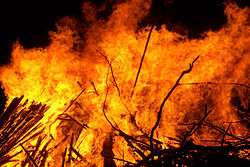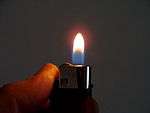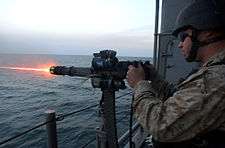Definify.com
Webster 1913 Edition
Fire
Fire
representing the heavenly
Fire
,Fire
,Webster 1828 Edition
Fire
FIRE
,FIRE
, v.t.FIRE
, v.i.Definition 2026
fire
fire
English



Noun
fire (countable and uncountable, plural fires)
- (uncountable) A (usually self-sustaining) chemical reaction involving the bonding of oxygen with carbon or other fuel, with the production of heat and the presence of flame or smouldering.
- (countable) Something that has produced or is capable of producing this chemical reaction, such as a campfire.
- We sat around the fire singing songs and telling stories.
- 1913, Joseph C. Lincoln, chapter 8, in Mr. Pratt's Patients:
- We toted in the wood and got the fire going nice and comfortable. Lord James still set in one of the chairs and Applegate had cabbaged the other and was hugging the stove.
- (countable) The often accidental occurrence of fire in a certain place.
- There was a fire at the school last night and the whole place burned down.
- During hot and dry summers many fires in forests are caused by regardlessly discarded cigarette butts.
- (uncountable, alchemy, philosophy) The aforementioned chemical reaction of burning, considered a one of the the Classical elements or basic elements of alchemy.
- (countable, Britain) A heater or stove used in place of a real fire (such as an electric fire).
- (countable) The elements necessary to start a fire.
- The fire was laid and needed to be lit.
- (uncountable) The bullets or other projectiles fired from a gun.
- The fire from the enemy guns kept us from attacking.
- Strength of passion, whether love or hate.
- Atterbury
- He had fire in his temper.
- Atterbury
- Liveliness of imagination or fancy; intellectual and moral enthusiasm.
- Alexander Pope
- And bless their critic with a poet's fire.
- Alexander Pope
- Splendour; brilliancy; lustre; hence, a star.
- William Shakespeare
- Stars, hide your fires.
- John Milton
- As in a zodiac representing the heavenly fires.
- William Shakespeare
- (countable) A button (on a joypad, joystick or similar device) usually used to make a video game character fire a weapon.
- Press fire to fire the gun.
Derived terms
Translations
|
|
|
|
|
|
|
|
|
|
|
Verb
fire (third-person singular simple present fires, present participle firing, simple past and past participle fired)
- (transitive) To set (something) on fire.
- 1897, H.G. Wells, The Invisible Man Chapter 20:
- "Then I slipped up again with a box of matches, fired my heap of paper and rubbish, put the chairs and bedding thereby, led the gas to the affair, by means of an india-rubber tube, and waving a farewell to the room left it for the last time." ¶ "You fired the house!" exclaimed Kemp. ¶ "Fired the house. It was the only way to cover my trail—and no doubt it was insured."
- 1907, Jack London, The Iron Heel
- It was long a question of debate, whether the burning of the South Side ghetto was accidental, or whether it was done by the Mercenaries; but it is definitely settled now that the ghetto was fired by the Mercenaries under orders from their chiefs.
- 1897, H.G. Wells, The Invisible Man Chapter 20:
- (transitive) To heat without setting on fire, as ceramic, metal objects, etc.
- If you fire the pottery at too high a temperature, it may crack.
- They fire the wood to make it easier to put a point on the end.
- 1908, W[illiam] B[lair] M[orton] Ferguson, Zollenstein, New York, N.Y.: D. Appleton & Company, OCLC 29686887 , chapter IV:
- So this was my future home, I thought! Certainly it made a brave picture. I had seen similar ones fired-in on many a Heidelberg stein. Backed by towering hills, […] a sky of palest Gobelin flecked with fat, fleecy little clouds, it in truth looked a dear little city; the city of one's dreams.
- (transitive) To drive away by setting a fire.
- William Shakespeare (c.1564–1616)
- Till my bad angel fire my good one out.
- William Shakespeare (c.1564–1616)
- (transitive) To terminate the employment contract of (an employee), especially for cause (such as misconduct or poor performance).
- 1969, Vladimir Nabokov, Ada or Ardor, Penguin 2011, p.226:
- The first, obvious choice was hysterical and fantastic Blanche – had there not been her timidity, her fear of being ‘fired’ […].
- 1969, Vladimir Nabokov, Ada or Ardor, Penguin 2011, p.226:
- (transitive) To shoot (a device that launches a projectile or a pulse of stream of something).
- We will fire our guns at the enemy.
- He fired his radar gun at passing cars.
- (intransitive) To shoot a gun, a cannon or a similar weapon.
- Don't fire until you see the whites of their eyes.
- His nail gun fired about twenty roofing nails a minute.
- (transitive, sports) To shoot; to attempt to score a goal.
- 2010 December 29, Mark Vesty, “Wigan 2-2 Arsenal”, in BBC:
- Andrey Arshavin equalised with a superb volley into the corner before Nicklas Bendtner coolly fired Arsenal in front.
-
- (intransitive, physiology) To cause an action potential in a cell.
- When a neuron fires, it transmits information.
- (transitive) To forcibly direct (something).
- He answered the questions the reporters fired at him.
- (intransitive, computer sciences, software engineering) To initiate an event (by means of an event handler).
- The event handler should only fire after all web page content has finished loading.
- To inflame; to irritate, as the passions.
- to fire the soul with anger, pride, or revenge
- John Dryden (1631-1700)
- Love had fired my mind.
- To animate; to give life or spirit to.
- to fire the genius of a young man
- To feed or serve the fire of.
- to fire a boiler
- To light up as if by fire; to illuminate.
- William Shakespeare (c.1564–1616)
- [The sun] fires the proud tops of the eastern pines.
- William Shakespeare (c.1564–1616)
- (farriery) To cauterize.
- (intransitive, dated) To catch fire; to be kindled.
- (intransitive, dated) To be irritated or inflamed with passion.
Synonyms
- (set on fire): See set on fire
- (transitive, shoot): let off, loose (archery), shoot
- (terminate the employment of): dehire, dismiss, give one's cards, give the boot, give the elbow, give the old heave-ho, let go, make redundant, sack, terminate, throw out, unhire; See also Wikisaurus:lay off.
- (intransitive, shoot a weapon): open fire, shoot
Antonyms
- (to terminate the employment): hire
Derived terms
Translations
|
|
|
|
|
|
|
Adjective
fire (not comparable)
- (slang) Great, amazing, extraordinary, dope.
Translations
Statistics
-
 Fire in the 1911 Encyclopædia Britannica.
Fire in the 1911 Encyclopædia Britannica.
Anagrams
Danish
Etymology 1
From Old Norse fjórir, from Proto-Germanic *fedwōr, from Proto-Indo-European *kʷetwóres (“four”).
Pronunciation
- IPA(key): /fiːrə/, [ˈfiːɐ]
Numeral
fire
- (cardinal) four
Etymology 2
From Middle Low German fīren, from French virer (“bear, veer”).
Pronunciation
- IPA(key): /fiːrə/, [ˈfiːɐ]
Verb
fire (imperative fir, infinitive at fire, present tense firer, past tense firede, perfect tense har firet)
- to lower something fixed to a rope or something similar
- 1871, Jens Andreas Friis, Lappisk Mythologi, page 138
- Saa gik han hen og firede Stenen og Vidietouget ned i Hullet.
- Then he went [to the hole] and lowered the rock and the wicker rope down into the hole.
- Saa gik han hen og firede Stenen og Vidietouget ned i Hullet.
- 2014, Teddy Vork, Diget, Tellerup A/S (ISBN 9788758811086)
- Han satte sig på knæ, famlede sig frem til tovet og vendte sig rundt så han havde ryggen til hullet, drejede overkroppen bagud, firede faklen ned i hullet.
- He kneeled, fumbled his way to the rope and turned around, such that his back was to the hole, twisted his torse backwards, lowered the torch into the hole.
- Han satte sig på knæ, famlede sig frem til tovet og vendte sig rundt så han havde ryggen til hullet, drejede overkroppen bagud, firede faklen ned i hullet.
- 1871, Jens Andreas Friis, Lappisk Mythologi, page 138
Conjugation
Italian
Etymology
From Latin fierī (“to become, be”), present active infinitive of fiō. Compare Romanian fi.
Pronunciation
- IPA(key): /ˈfire/, [ˈfiː.r̺e]
- Hyphenation: fì‧re
Verb
fire
- (Northern Italy, obsolete) to be
Usage notes
- The only forms attested outside of ancient Northern Italian literature are the future fia (third-person singular) and fiano (third-person plural).
Norwegian Bokmål
| < 3 | 4 | 5 > |
|---|---|---|
| Cardinal : fire Ordinal : fjerde | ||
Etymology 1
From Old Norse fjórir via Danish fire; from Proto-Germanic *fedwōr, from *kʷetwṓr, the neuter form of Proto-Indo-European *kʷetwóres.
Pronunciation
- IPA(key): /'fiːɾə/
Numeral
fire
- (cardinal) four
Related terms
- fjerde (ordinal)
Derived terms
Etymology 2
From French virer, via Middle Low German firen
Verb
fire (imperative fir, present tense firer, passive fires, simple past fira or firet or firte, past participle fira or firet or firt, present participle firende)
References
- “fire” in The Bokmål Dictionary.
Norwegian Nynorsk
Etymology 1
From Old Norse fjórir, via Danish fire.
Numeral
fire
- (cardinal) four
Related terms
- fjerde (ordinal)
Derived terms
- firedel
- firehjulsdrift
- fireåring, firåring
- firkant
Etymology 2
From French virer, via Middle Low German firen
Verb
fire
References
- “fire” in The Nynorsk Dictionary.
Romanian
Etymology 1
Noun
fire
- plural of fir
Etymology 2
Noun
fire
Synonyms
- (nature): natură
- (character): caracter, temperment
- (mind): minte